高一英语直接引语和间接引语
高一英语直接引语和间接引语
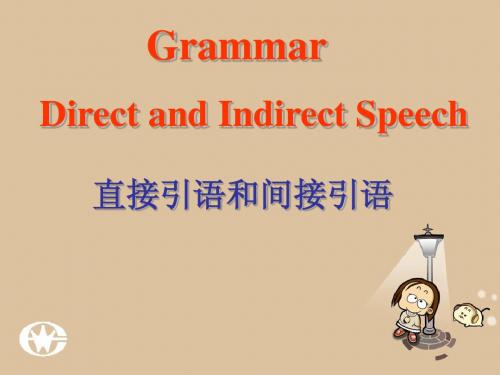
选择疑问句 •用whether…or…表达,而不用if…or…,也 不用either…or… • He asked, “Do you speak English or French?” • He asked me whether I spoke English or French. • I asked, “Will you take a bus or take a train?” • I asked him whether he would take a bus or take a train.
在直接引语变为间接引语时需要注意的变化 1. 注意时态的变化 2. 注意人称变化。
3. 注意指示代词的变化
4. 注意时间的变化 5. 注意地点的变化 6. 注意个别趋向动词的变化
直接引语
间接引语
指示代词
时 间 状 语
this, these that, those now, today then, that day this week that week yesterday the day before last week the week before four days ago four days before yesterday the day before the day before two days before yesterday the next day tomorrow the next month next month
4. “Why were you late again?” The teacher said to me. The teacher asked me why I was late again. 5. “I don’t like swimming,” said Sarah. Sarah said she didn’t like swimming. 6. His friends asked him if he would go to Dalian. His friends asked him, “Will you go to Dalian?” 7. “Have you been to Paris?” My classmate asked me. My classmate asked me if I had been to Paris.
高一英语Unit 1 grammar直接引语与间接引语-人教版[整理]
![高一英语Unit 1 grammar直接引语与间接引语-人教版[整理]](https://img.taocdn.com/s3/m/8c5ea96ea45177232f60a278.png)
Conclusion
1. 当主句的谓语动词是一般现在时的时候 2. 当主句的谓语动词是将来时的时候 3. 当直接引语部分带有具体的过去时间状 语时 4. 当直接引语中有以when, while引导的从 句,表示过去的时间时 5. 当直接引语是客观真理或自然现象时 6. 当引语是谚语、格言时 7. 当直接引语中有情态动词should, would, could, had better, would rather, might, must, ought to, used to, need时
Tom
said that they were listening to the pop music. Mother asked, “Have you finished your homework before you watch TV?” Mother asked me whether I had finished my homework before I watched TV.
Our teacher said to us, “Light travels faster than sound. ” Our teacher told us that light travels faster than sound. He said,“Practice makes perfect. ” He said that practice makes perfect. He said, “She must be a teacher. ” He said that she must be a teacher. The doctor said, “You'd better drink plenty of water. ” The doctor said I'd better drink plenty of water.
高一英语直接引语和间接引语,被动语态,虚拟语气,定语从句语法知识总结和练习
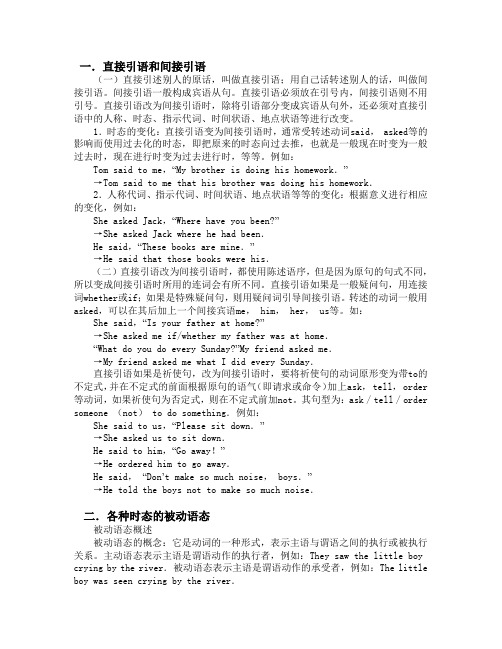
一.直接引语和间接引语(一)直接引述别人的原话,叫做直接引语;用自己话转述别人的话,叫做间接引语。
间接引语一般构成宾语从句。
直接引语必须放在引号内,间接引语则不用引号。
直接引语改为间接引语时,除将引语部分变成宾语从句外,还必须对直接引语中的人称、时态、指示代词、时间状语、地点状语等进行改变。
1.时态的变化:直接引语变为间接引语时,通常受转述动词said, asked等的影响而使用过去化的时态,即把原来的时态向过去推,也就是一般现在时变为一般过去时,现在进行时变为过去进行时,等等。
例如:Tom said to me,“My brother is doing his homework.”→Tom said to me that his brother was doing his homework.2.人称代词、指示代词、时间状语、地点状语等等的变化:根据意义进行相应的变化,例如:She asked Jack,“Where have you been?”→She asked Jack where he had been.He said,“These books are mine.”→He said that those books were his.(二)直接引语改为间接引语时,都使用陈述语序,但是因为原句的句式不同,所以变成间接引语时所用的连词会有所不同。
直接引语如果是一般疑问句,用连接词whether或if;如果是特殊疑问句,则用疑问词引导间接引语。
转述的动词一般用asked,可以在其后加上一个间接宾语me, him, her, us等。
如:She said,“Is your father at home?”→She asked me if/whether my father was at home.“What do you do every Sunday?”My friend asked me.→My friend asked me what I did every Sunday.直接引语如果是祈使句,改为间接引语时,要将祈使句的动词原形变为带to的不定式,并在不定式的前面根据原句的语气(即请求或命令)加上ask, tell, order 等动词,如果祈使句为否定式,则在不定式前加not。
高中英语直接引语和间接引语讲解
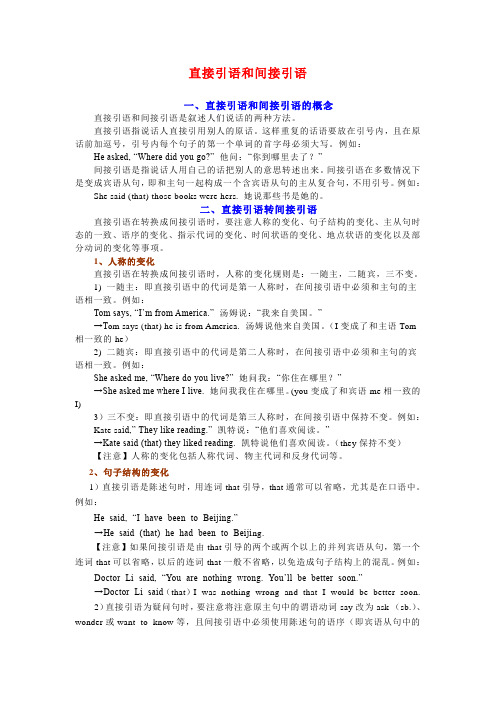
直接引语和间接引语一、直接引语和间接引语的概念直接引语和间接引语是叙述人们说话的两种方法。
直接引语指说话人直接引用别人的原话。
这样重复的话语要放在引号内,且在原话前加逗号,引号内每个句子的第一个单词的首字母必须大写。
例如:He asked, “Where did you go?” 他问:“你到哪里去了?”间接引语是指说话人用自己的话把别人的意思转述出来。
间接引语在多数情况下是变成宾语从句,即和主句一起构成一个含宾语从句的主从复合句,不用引号。
例如:She said (that) those books were hers. 她说那些书是她的。
二、直接引语转间接引语直接引语在转换成间接引语时,要注意人称的变化、句子结构的变化、主从句时态的一致、语序的变化、指示代词的变化、时间状语的变化、地点状语的变化以及部分动词的变化等事项。
1、人称的变化直接引语在转换成间接引语时,人称的变化规则是:一随主,二随宾,三不变。
1) 一随主:即直接引语中的代词是第一人称时,在间接引语中必须和主句的主语相一致。
例如:Tom says, “I’m from America.” 汤姆说:“我来自美国。
”→T om says (that) he is from America. 汤姆说他来自美国。
(I变成了和主语Tom 相一致的he)2) 二随宾:即直接引语中的代词是第二人称时,在间接引语中必须和主句的宾语相一致。
例如:She asked me, “Where do you live?” 她问我:“你住在哪里?”→She asked me where I live. 她问我我住在哪里。
(you变成了和宾语me相一致的I)3)三不变:即直接引语中的代词是第三人称时,在间接引语中保持不变。
例如:Kate sa id,” They like reading.” 凯特说:“他们喜欢阅读。
”→Kate said (that) they liked reading. 凯特说他们喜欢阅读。
(完整版)英语语法----直接引语和间接引语
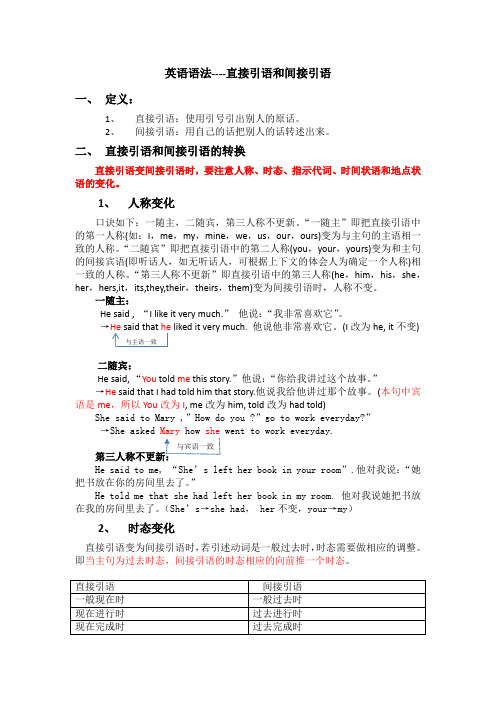
英语语法----直接引语和间接引语一、 定义:1、 直接引语:使用引号引出别人的原话。
2、间接引语:用自己的话把别人的话转述出来。
二、 直接引语和间接引语的转换直接引语变间接引语时,要注意人称、时态、指示代词、时间状语和地点状语的变化。
1、 人称变化口诀如下:一随主,二随宾,第三人称不更新。
“一随主”即把直接引语中的第一人称(如:I ,me ,my ,mine ,we ,us ,our ,ours)变为与主句的主语相一致的人称。
“二随宾”即把直接引语中的第二人称(you ,your ,yours)变为和主句的间接宾语(即听话人,如无听话人,可根据上下文的体会人为确定一个人称)相一致的人称。
“第三人称不更新”即直接引语中的第三人称(he ,him ,his ,she ,her ,hers,it ,its,they,their ,theirs ,them)变为间接引语时,人称不变。
一随主:He said , “I like it very much.” 他说:“我非常喜欢它”。
→liked it very much. 他说他非常喜欢它。
(I 改为he, it 不变)二随宾:He said, “You told me this story.”他说:“你给我讲过这个故事。
”→He said that I had told him that story.他说我给他讲过那个故事。
(本句中宾语是me ,所以You 改为I , me 改为him, told 改为had told)She said to Mary ,”How do you ?”go to work everyday?” →She asked Mary how she went to work everyday. 第三人称不更新:He said to me, “She’s left her book in your room ”.他对我说:“她把书放在你的房间里去了。
人教版高一英语--直接引语与间接引语的转换
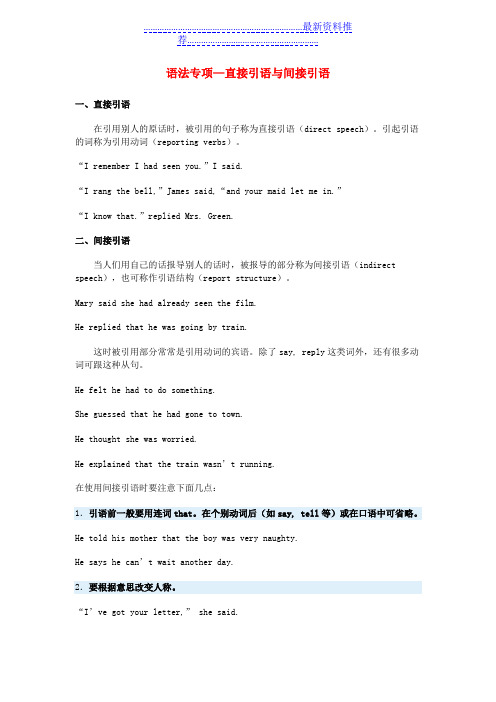
语法专项—直接引语与间接引语一、直接引语在引用别人的原话时,被引用的句子称为直接引语(direct speech)。
引起引语的词称为引用动词(reporting verbs)。
“I remember I had seen you.”I said.“I rang the bell,”James said,“and your maid let me in.”“I know that.”replied Mrs. Green.二、间接引语当人们用自己的话报导别人的话时,被报导的部分称为间接引语(indirect speech),也可称作引语结构(report structure)。
Mary said she had already seen the film.He replied that he was going by train.这时被引用部分常常是引用动词的宾语。
除了say, reply这类词外,还有很多动词可跟这种从句。
He felt he had to do something.She guessed that he had gone to town.He thought she was worried.He explained that the train wasn’t running.在使用间接引语时要注意下面几点:1.引语前一般要用连词that。
在个别动词后(如say, tell等)或在口语中可省略。
He told his mother that the boy was very naughty.He says he can’t wait another day.2.要根据意思改变人称。
“I’ve got your letter,” she said.→She said to him, “Your pronunciation is better than mine.”→3.引语中的谓语要和句子主要谓语在时态上一致。
英语中的直接引语和间接引语

英语中的直接引语和间接引语一、直接引语和间接引语的概念1. 直接引语- 直接引语就是直接引用别人的原话,被引用的部分通常放在引号内。
例如:He said, "I am going to the park." 在这个句子中,“I am going to the park.”就是直接引语,它原封不动地呈现了说话者所说的内容。
2. 间接引语- 间接引语是用自己的话转述别人的话,不用引号。
例如:He said that he was going to the park. 这里“he was going to the park”就是间接引语,它是对原句“He said, 'I am going to the park.'”的转述。
二、直接引语变间接引语的变化规则1. 人称的变化- 如果直接引语中的主语是第一人称(I或we),在变为间接引语时,要根据句子的意思相应地变为第三人称(he/she或they)。
- 例如:- 直接引语:I said, "I like this book."- 间接引语:I said that I liked this book.(这里因为主语都是I,人称不变,但如果是He said, "I like this book." 变为间接引语就是He said that he liked this book.)- 如果直接引语中的第二人称(you),在变为间接引语时,要根据转述者和听话者的关系变为第一人称(I/we)或第三人称(he/she/they)。
- 例如:- 直接引语:He said to me, "You are a good student."- 间接引语:He told me that I was a good student.- 直接引语:He said to her, "You should study hard."- 间接引语:He told her that she should study hard.2. 时态的变化- 一般现在时变为一般过去时。
高中英语必修1:Unit 1 直接引语和间接引语

Unit one FriendshipDirect speech and indirect speech(直接引语和间接引语)一.基本概念I直接引语变为间接引语1)、直接引语为陈述句2)、直接引语为祈使句3)、直接引语为疑问句4)、直接引语为感叹句II1、直接引语和间接引语都属于宾语从句2、直接引语和间接引语的概念(1)直接引语:一字不改地引述别人的话(2)间接引语:用说话人自己的话转述别人的话二.变换类型1.直接引语为陈述句直接引语为陈述句,用that引导(口语中可以省略)。
引述动词有:say, tell等。
陈述句变间接引语要注意:1、人称的变化2、指示代词、时间状语、地点状语和动词的变化3、时态的变化4、人称的变化。
一般的规则:一随主,二随宾,三不变例如:The teacher said, “John, you must bring your book to the class. ”1> 第三者说:The teacher told John that he must bring his book to the class.2> 别人对约翰说:The teacher said that you must bring your book to the class.3> 约翰自己说:The teacher said that I must bring my book to the class.I指示代词、时间状语、地点状语和动词的变化1〉指示代词的变化this---- that these----those2〉时间状语的变化now---- then ago---- before today----that day yesterday----the day before; theprevious day tomorrow----the next day; the following day the day beforeyesterday----two days before the day after tomorrow----two days later nextweek/month, etc.----the next week/month, etc. last week/month, etc.----theweek/month before3〉地点状语的变化here----there4〉动词的变化come----go注:在当地转述时,here不变为there,come不变为go.在当天转述时,yesterday, tomorrow等时间状语也不变。
- 1、下载文档前请自行甄别文档内容的完整性,平台不提供额外的编辑、内容补充、找答案等附加服务。
- 2、"仅部分预览"的文档,不可在线预览部分如存在完整性等问题,可反馈申请退款(可完整预览的文档不适用该条件!)。
- 3、如文档侵犯您的权益,请联系客服反馈,我们会尽快为您处理(人工客服工作时间:9:00-18:30)。
He asked her whether/if she had passed the exam.
Exercise
1. “I like reading adventure stories,” said John. John said that he liked reading adventure stories.
• “I was driving carefully when my car hit the tree.” He told the police.
• He told the police that he had been driving carefully when his car hit the tree.” He told the police.
He said to me, “I’ve left my book in your room.”
He told me that he had left his book in my room.
状 直接引语中的状语 语 now 变 ago 化 today
间接引语中的状语
then before/earlier that day
Phelps said he had started swimming at an young age in order to treat his ADHD disease.
“I receive a 5-hour training every day.”
Phelps said he received a 5-hour training every day.
“I always desire to be the winner, to win gold medals and to break world records.”
Phelps said he always desired to be the winner, to win gold medals and to break world records.
Next week/month… the following/ next week She said to me,”I lived there five years ago.”
• She told me she had lived there five years before. She said to me,”I will see her next week.” She told me she would see her the next week.
Jane asked whether it was Mary.
“Is it Mary or Lucy?”asked Jane. Jane asked whether it was Mary or Lucy.
• 注意
➢ Whether 可与or not 连用, 表示一种选择。而if 则不可。 He wants to know whether or not we went to dinner.
Phelps said he had a long body and long arms, and a gift and love for swimming.
“I started swimming at an young age in order to treat my ADHD disease.”
词whether(或if)。
“Is there something wrong,Madam?”asked the policeman. The policeman asked the woman whether/if there was something wrong.
She asked, “What it is? What’s going to happen now?” She asked what it was and what was going to happen then. “It’s Mary,isn’t it?”asked Jane.
人称变化
直接 引语 代词
I we you me us this these
间接
引语 he/ they I him/ them that those
代词 she
her
不需要强记,根据句子意思所指来判断.
He said, “I like it very much.”
He said that he liked it very much.
this morning/
that morning/week……
this week……
yesterday
the day before
yesterday morning the morning before
tomorrow
the next day/the following day
last week/month… the week/ month before…
➢ 当疑问词作主语时,间接引语的语序不变。 “What’s the matter with you?”said the docotor. The docotor asked what’s the matter with me.
Michael Phelps
“I have a long body and long arms, a gift and love for swimming.”
直接引语变间接引语时态不变的情况
✓当主句谓语动词是一般现在时、现在完成 时、一般将来时态时。
✓当直接引语是客观真理时。
✓当直接引语中有具体的过去某年、某月、某日作状 语时。 ✓当直接引语是过去完成时态时。
✓当直接引语表示的是谚语或名人名言时。
✓当直接引语表示客观的时刻表时。
• She says, “Miss liu is good at English.” • She says Miss liu is good at English.
“One of my favorite things is to compete with the best swimmers in the world.”
Phelps said one of his favorite things was to compete with the best swimmers in the world.
it.” • Jim said (that) he had read Tony ’s book and he didn’t
understand it.
直接引语为疑问句时变间接引语的句型变化:
直接引语为疑问句时,变为间接引语时除注意在人称、 时态和状语等方面相应变化外,还应注意:
• 间接引语应改为陈述语序。 • 特殊疑问句的疑问词应保留。 • 一般疑问句、选择疑问句和反意疑问句在变为间接引语时要用连
“ Will you go abroad or stay in Beijing?”he asked
me. He asked me whether/if I would go abroad or stay
in Beijing.
He asked her, “You have passed the eaxm, haven’t
• He said that where there is a will, there is a way.
• He said, “The plane takes off at 6:30 am.” • He said that the plane takes off at 6:30 am.
注意
• 主从复合句的直接引语变为间接引语时, 从句中的一般过去时通常不变为过去完成 时。
Tom said to me, “Do you like football?”
• Tom asked me whether/if I liked football.
He said, “These books are mine.”
• He said that those books were his.
She said, “I went there yesterday.”
She said that she had gone there the day before.
“ I’ll finish my work tomorrow,”she said.
She said that she would finish her work the next day.
• Mother said to me, “What are you doing in the room?”
• Mother asked me what I was doing in the room.
He asked , “Can I borrow your bike?”
• He asked whether/if he could borrow my bike.
• She said,“They had left when I arrived there. ”
• She said they had left when she arrived there.
• He said, “ Where there is a will, there is a way. ”(有志者,事竟成 )
Phelps said he would always try his best to be Phelps No.1.
My brother said to me, “I’m going to have a holiday next week.
• My brother told me he was going to have a holiday the next week.
